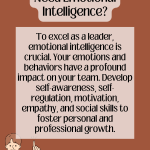Emotional Intelligence as a Leader: Unleash Your Full Potential
Last Updated on 9 months by Iva Ursano
Have you ever wondered what makes an outstanding leader truly stand out? It’s intriguing to learn that exceptional skills and decision-making prowess are not the only factors at play. There’s another critical element: emotional intelligence as a leader.

Envision a leader who possesses an extraordinary knack for maintaining composure in the midst of adversity. They effortlessly foster trust with their team, attentively embrace diverse perspectives, and consistently make informed decisions. These very qualities are intricately intertwined with the concept of high emotional intelligence.
When you grasp and enhance your emotional intelligence, you unleash your complete leadership potential, paving the way for a positive influence on your team and organization.
That’s precisely why this article delves into the significance of emotional intelligence for leaders, providing valuable insights on how you can cultivate and strengthen this indispensable trait.
What Is Emotional Intelligence?

Emotional intelligence is all about comprehending and managing your own emotions and the emotions of others. When you possess high emotional intelligence, you have a strong awareness of your own emotions, understanding their impact, and the ability to navigate social interactions with empathy. Developing emotional intelligence leads to personal growth and helps build stronger connections with others, fostering harmonious relationships and creating a healthier social environment.
In the realm of leadership, emotional intelligence plays a significant role. Leaders who excel in emotional intelligence are skilled at forming emotional connections with their team members, which greatly impacts engagement and productivity. By harnessing the power of emotional intelligence, leaders create a work environment that is supportive and full of wisdom. This nurturing atmosphere encourages collaboration, builds trust among team members, and fuels motivation.
Recognizing the importance of emotional intelligence in leadership empowers leaders to actively cultivate this essential skill. By doing so, leaders establish a strong foundation for effective leadership and drive success within their teams and organizations. Prioritizing emotional intelligence demonstrates a genuine understanding and empathy, profoundly impacting the well-being and performance of the entire team.
How To Boost Your Emotional Intelligence As A Leader
Self-Awareness

One of the most important emotional intelligence as a leader is being self-aware as a leader is crucial. It means understanding how your emotions affect those around you. But it goes beyond just emotions. Take the time to know your ego, your strengths, and your weaknesses. With mindfulness, make sure your personal qualities work for the benefit of your team and organization.
Embrace your innate qualities to become a valuable asset, contributing to overall success. When self-awareness becomes a priority, you set yourself apart as a leader focused on growth and dedicated to creating a harmonious environment where everyone thrives.
Self-Management

Imagine yourself as your own boss, someone who strikes a balance between being firm and fair. It’s important to cultivate the skill of emotional self-control, so you can handle situations without losing your cool or compromising your ethical standards. Take ownership of your actions and lead by example. When you remain composed, it has a reassuring effect on those around you, motivating them to follow your positive lead.
Remember to uphold organizational ethics and act responsibly, demonstrating integrity in all that you do. As a leader, you hold the power to shape the atmosphere for your team, fostering an environment of accountability and ethical behavior.
Social Awareness

Did you know that empathy is among the most important leadership skills? Cultivate compassion as a leader to empathize and understand others’ perspectives, nurturing your team’s growth. Challenge stereotypes, creating an inclusive environment where everyone feels valued. Deliver critical feedback with empathy, guiding wisely and sensitively.
Exceptional leaders in social awareness are masters of empathy, genuinely seeking to understand their colleagues’ feelings and perspectives. By embracing social awareness and empathy, you can communicate and collaborate effectively, fostering stronger relationships and achieving better outcomes in the workplace.
Relationship Management

Emotional intelligence as a leader means effortlessly connecting with others on an emotional level through their exceptional social skills. When delivering news, strive to leave people feeling empowered and motivated to improve, regardless of whether it’s good or bad news. Enhance your conflict resolution abilities and guide your team through change with finesse, always considering the delicate nature of the situation.
In decisions affecting people’s lives, let your high Emotional Intelligence shine. Show genuine respect for the needs, fears, and hopes of those involved, going the extra mile to navigate challenges with empathy and care. By honing your understanding of others and cultivating a supportive and considerate environment, you can become a standout leader who inspires and uplifts those around you.
Are you Emotionally Intelligent? Try taking this quiz to find out.
5 Reasons Why Leaders Need Emotional Intelligence
Leaders have a big responsibility when it comes to setting the tone of an organization. It’s not just about having good communication and technical skills–emotional intelligence is equally important. In today’s complex and competitive world, leaders must possess emotional intelligence to ensure their organizations not only survive but also thrive.

Emotional intelligence as a leader means:
- They create a work culture that radiates positivity, igniting a spark of enthusiasm that propels efficiency and productivity to new heights.
- They ignite a flame of growth, stimulating innovation and nurturing a creative environment where ideas flourish, driving the organization forward.
- They serve as pillars of support, empowering every individual to unleash their full potential, fueling their passion and contributions to the organization’s overall success.
- They possess the compass of emotional intelligence, guiding them through challenging times, ensuring wise decisions that navigate obstacles and pave the way for triumph.
- They weave a tapestry of connection, building unbreakable bonds with their team members, fostering trust, collaboration, and unwavering support, resulting in a unified, high-performing team that achieves greatness together.
How To Keep In Touch With Your Emotions
Journal Your Thoughts

Reflect on your workday, noting both positive and negative experiences. This simple act of jotting down thoughts can be transformative. It helps you identify patterns in your own behavior and reactions, as well as those of others. Take a closer look at your strengths and consider your employees’ emotions.
Identify what triggers frustration and explore underlying reasons. Increased introspection equips you to navigate future challenges with greater ease. By cultivating self-awareness, you can avoid outbursts and adopt actions that enhance employee morale. Grab a pen and start reflecting to unlock valuable insights.
Listen Actively

In today’s busy world, it’s easy to get distracted by technology and your own thoughts, but being a good listener is crucial if you want to excel as a communicator and a thoughtful leader who understands emotions.
To boost your emotional intelligence, make an effort to practice active listening. Give your undivided attention to the speaker and demonstrate your interest by paraphrasing and using gestures like nodding. When you actively listen in the workplace, it enhances your ability to connect with others and genuinely grasp their thoughts and feelings. So, let’s prioritize focus, set distractions aside, and embrace active listening as a way to forge stronger relationships and elevate our emotional intelligence.
Process Your Emotions

Take the time to understand your own emotions in order to comprehend the emotions of others. When you feel a strong emotion, positive or negative, pause and reflect on what you’re feeling and why. Explore the triggers behind your emotional response.
By practicing this self-reflection, you enhance your self-awareness and gain a deeper understanding of the emotions your colleagues may be experiencing. As a leader with empathy, this heightened awareness allows you to nurture an environment that encourages a high-performing team. By acknowledging and understanding your own emotions, you can foster a culture of empathy, support, and collaboration, driving your team toward success.
Helping You Gain Emotional Intelligence As A Leader
To excel as a leader, emotional intelligence is crucial. Your emotions and behaviors have a profound impact on your team. Develop self-awareness, self-regulation, motivation, empathy, and social skills to foster personal and professional growth. Forge deeper connections and cultivate a positive work environment for increased success. Seize the opportunity to enhance your emotional intelligence, pursuing self-improvement for greater leadership prowess. Nurture emotional intelligence, and unlock a path to exceptional leadership, reaping endless rewards.
If you want to explore more about self-improvement, make sure to check these topics:









